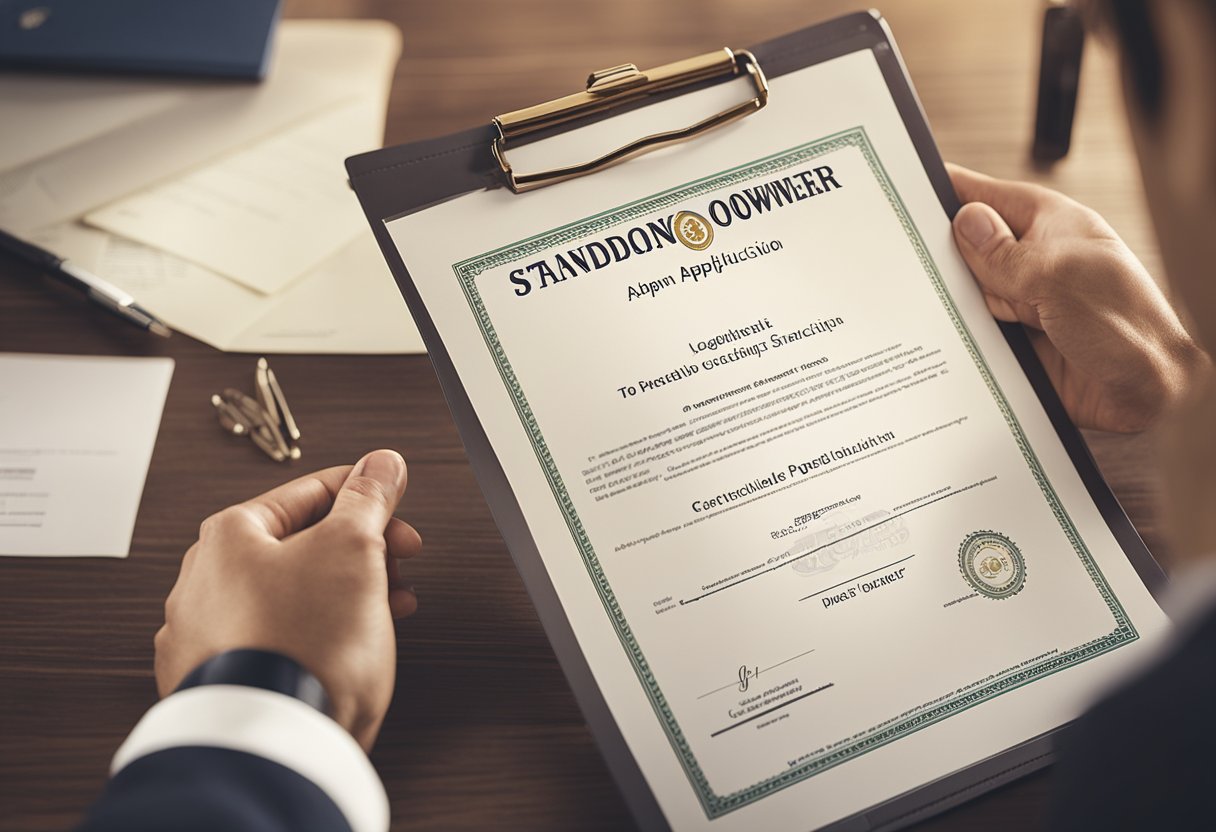When it comes to obtaining a business loan, there are a variety of factors that lenders consider before approving an application. One such factor is the business’s standing with the state in which it is registered. A Certificate of Good Standing, also known as a Certificate of Existence or Certificate of Authorization, can play a key role in securing a loan for your business.

A Certificate of Good Standing is a legal document that verifies a business is in compliance with state regulations and has paid all necessary fees and taxes. It also confirms that the business is authorized to conduct business within the state. This document can be obtained from the state government agency responsible for registering businesses, such as the Secretary of State’s office.
Many lenders require a Certificate of Good Standing as part of the loan application process. This is because it provides assurance that the business is in good standing with the state and is operating legally. Without this document, lenders may view the business as a greater risk and be less likely to approve a loan application. If you’re considering applying for a business loan, obtaining a Certificate of Good Standing should be a top priority.
Understanding Certificates of Good Standing

A Certificate of Good Standing is a document that confirms a business entity’s compliance with state regulations. It is also known as a Certificate of Existence, Certificate of Status, or Certificate of Authorization, depending on the state. The certificate is issued by the Secretary of State’s office where the business is registered.
What Is a Certificate of Good Standing?
A Certificate of Good Standing is a legal document that proves a business entity’s compliance with state regulations. It confirms that the business has filed all required annual reports and tax returns and has paid all necessary fees. The certificate is evidence that the business is authorized to do business in the state and that it is in good standing with the state.
Why It Matters for Your Loan Application
When applying for a business loan, lenders often require a Certificate of Good Standing to verify that the business is in compliance with state regulations. This document assures the lender that the business is authorized to do business in the state and that it is in good standing with the state. This reduces the lender’s risk and increases the chances of the loan being approved.
How to Obtain a Certificate
To obtain a Certificate of Good Standing, a business entity must contact the Secretary of State’s office where it is registered. The process may vary depending on the state, but generally, the business will need to provide its name, address, and other identifying information. The Secretary of State’s office will then verify that the business is in compliance with state regulations and issue the certificate if everything is in order.
In conclusion, a Certificate of Good Standing is a crucial document for a business entity seeking a loan. It confirms the business’s compliance with state regulations and assures the lender that it is authorized to do business in the state. Obtaining a Certificate of Good Standing is a relatively simple process that can be done by contacting the Secretary of State’s office where the business is registered.
The Loan Application Process

When applying for a business loan, the process can seem overwhelming. However, by breaking it down into manageable steps, the process can be more easily navigated. Here are some key steps to consider when applying for a business loan.
Evaluating Different Business Loans
Before applying for a business loan, it is important to evaluate the different types of loans available. This can include traditional bank loans, SBA loans, and online lenders. Each type of loan has its own unique requirements and benefits, so it is important to evaluate each option carefully.
Preparing Necessary Documents
When applying for a business loan, there are several documents that will be required. These can include business tax returns, personal tax returns, a business plan, financial statements, and more. It is important to gather all necessary documents ahead of time to ensure a smooth application process.
Meeting Lender Requirements
Lenders will have their own set of requirements for borrowers. This can include a minimum credit score, collateral requirements, and a personal guarantee. It is important to review these requirements before applying for a loan to ensure that all requirements can be met.
Overall, the loan application process can be complex, but by understanding the different types of loans available, gathering necessary documents, and meeting lender requirements, business owners can increase their chances of securing financing at a favorable interest rate.
Financial Considerations for Businesses

When it comes to running a business, financial considerations are always at the forefront. From managing debt and credit to exploring lines of credit and funding options, there are many factors to consider. Additionally, the impact of business structure on financing cannot be overlooked. Here are some key points to keep in mind:
Managing Debt and Credit
Debt is a common aspect of running a business, but it’s important to manage it effectively. This includes making payments on time and avoiding taking on too much debt. It’s also important to maintain good credit, as this can impact the ability to secure financing in the future.
Exploring Lines of Credit and Funding Options
Businesses may need access to funding for a variety of reasons, such as purchasing equipment or expanding operations. One option is to explore lines of credit, which can provide a flexible source of funding. Other funding options include small business loans and investors.
The Impact of Business Structure on Financing
The structure of a business can impact its ability to secure financing. Corporations and limited liability companies may have an easier time securing funding than sole proprietorships or general partnerships. Additionally, the amount of capital invested in the business can also impact financing options.
Overall, it’s important for businesses to carefully consider their financial situation and explore all available options before making any decisions. Business insurance can also be a valuable tool for protecting against unexpected financial challenges.
Maintaining Good Standing and Compliance

To obtain a business loan, a Certificate of Good Standing is a crucial requirement. However, it is equally important to maintain good standing and compliance to continue to be eligible for loans and other benefits. Here are some key factors to consider:
Regular Filings and State Requirements
To maintain good standing, businesses must comply with state requirements and file all necessary paperwork on time. This includes annual reports, taxes, and other filings required by the state. Failure to comply with these requirements can result in penalties, fines, and even loss of good standing.
Renewing Business Licenses and Permits
Businesses must also renew their licenses and permits on time to maintain good standing. This includes business licenses, permits for specific activities, and any other licenses required by the state or local government. Renewal fees and expiration dates vary depending on the type of license or permit.
Consequences of Losing Good Standing
Losing good standing can have serious consequences for a business. It can lead to the loss of government contracts, difficulty obtaining loans and financing, and damage to the company’s reputation. To avoid these consequences, businesses should ensure they are legally authorized to operate and comply with all state and local regulations.
In summary, maintaining good standing and compliance is essential for businesses to continue to be eligible for loans and other benefits. This requires regular filings, renewing licenses and permits, and adhering to state and local regulations. By doing so, businesses can ensure they are in good standing and eligible for the benefits that come with it.
Frequently Asked Questions

What is the process for obtaining a Certificate of Good Standing for my business?
The process for obtaining a Certificate of Good Standing varies depending on the state your business is registered in. Generally, you will need to request the certificate from the state’s Secretary of State office or equivalent agency. You may need to provide certain information about your business, such as its name, address, and registration number, and pay a fee. The certificate will typically be issued within a few days to a few weeks.
Can a Certificate of Good Standing impact my ability to secure a business loan?
Yes, a Certificate of Good Standing can impact your ability to secure a business loan. Lenders may require a Certificate of Good Standing as part of their due diligence process to ensure that your business is in good standing with the state and has complied with all necessary regulations. Without a Certificate of Good Standing, lenders may view your business as a higher risk and be less likely to approve your loan application.
What are the requirements to maintain a Certificate of Good Standing for an LLC?
The requirements to maintain a Certificate of Good Standing for an LLC vary depending on the state your business is registered in. Generally, you will need to file annual reports and pay any necessary fees to the state. You may also need to maintain a registered agent and comply with any other state-specific regulations. Failing to meet these requirements can result in your business losing its good standing status and potentially impacting your ability to secure a loan.
How does a Certificate of Good Standing differ from a Certificate of Status?
A Certificate of Good Standing and a Certificate of Status are similar documents, but they serve different purposes. A Certificate of Good Standing confirms that your business is in compliance with all necessary regulations and has paid all necessary fees, while a Certificate of Status simply confirms that your business is registered with the state and has not been dissolved or terminated.
What specific information is displayed on a Certificate of Good Standing?
The specific information displayed on a Certificate of Good Standing varies depending on the state your business is registered in. Generally, the certificate will include your business’s name, address, registration number, and the date it was first registered. It may also include information about your business’s current standing with the state and any compliance issues.
What documentation do banks typically require from businesses applying for a loan?
Banks typically require a variety of documentation from businesses applying for a loan, including financial statements, tax returns, business plans, and legal documents such as Articles of Incorporation or Operating Agreements. Additionally, they may require a Certificate of Good Standing to confirm that your business is in good standing with the state. It’s important to review the specific requirements of each lender and provide all necessary documentation to increase your chances of securing a loan.
